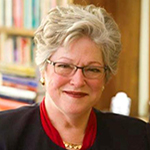 By Molly T. Marshall
By Molly T. Marshall
I have invested time this summer reading David Brooks’ fine book, The Road to Character. He did not write it quickly — nearly seven years in the making — and in it he contrasts two forms of résumé: the CV with which we try to impress others and the eulogy, where the truth of a life well-lived is told. I have been impressed by the clarity of his thinking in a time when “moral realism” is in short supply.
His basic thesis is that character is formed over a lifetime of paying attention to one’s circumstances, examining the self, gaining empathy for the wounds of others, and self-conquest. Humility is essential — understanding one’s vulnerable places and past failures. Figures like Dorothy Day of the Catholic Worker’s Movement; Samuel Johnson, the great English man of letters; St. Augustine (before he was a saint!); General Eisenhower; and civil rights workers Randolph and Ruskin demonstrate what it means to recognize that theirs was a “summoned self.” Each was granted a vision of his or her life’s work and pursued it with alacrity. Flawed humans, to be sure, yet their perseverance in vocation was transformative.
Isn’t this what we all want — a life of significance that makes a difference, a life in tune with God? Don’t we each long to maximize opportunities and live into what God calls us to be? God places the dream of the restoration of all things into our hearts, and invites us to be full participants in making all things new. We are called to be “on a mission from God,” and I don’t mean the one the Blues Brothers were on!
This is the Apostle Paul’s story; he had been flattened by a blaze of light, and he spent the rest of his life proclaiming how his encounter with Christ had reoriented his whole life. We get a glimpse of his mature character at the end of 1 Corinthians.
Writing from the second largest city in the Roman Empire, Ephesus, Paul tells the Corinthian Christians of his travel plans. Rather than hurrying in their direction, he says he will stay on where he is — at least through Pentecost “because a great door for effective work has opened to me, and there are many who oppose me” (1 Cor. 16:9). This is a rather self-differentiated response, as family systems theory would say. Paul will not be dislodged from the door God is opening just because the fractious Corinthians were beckoning.
It had not been a pleasant season in his ministry. He had been personally attacked by other Christian leaders; his life had been seriously threatened in Ephesus; and he faced “fears from within,” referred to in 2 Corinthians 7:5. He knew adversaries, yet did not lose heart. While we may never know the real cause of Paul’s extremity, it certainly was a challenge to his calling.
Paul recognizes that God has given him a great opportunity in this city laden with Roman culture: worship of the goddess Diana, a massive theatre that held 24,000 people and, a cosmopolitan reputation. It is hard to determine what Paul’s breakthrough had been, but with keen discernment he knows that this is “his door.” And in a megacity, he calls it “mega.”
I heard Joel Gregory preach from this text at the Baptist World Congress, and he stressed that too many of us want to abandon our door, for we are discontented or jealous of where God placed others. I recently talked to a pastor about his frank envy of others who lead a “tall steeple” church. I respected his candor. It is always easier to look beyond our present location (Mount Disconsolate?) to “Mount Pleasant.”
Then, when we find that others oppose us, we want no part of it. While Paul seems to interpret his opposition as a sign that he is on the right track, few of us practice staying by our door, where God has placed us. At the first sign of disapproval or a poor performance review, we are ready to pack it up.
The structure of Paul’s sentence implies that God has been at work in this context. Literally, the Greek reads: “For a door has opened to me, great and effective.” Paul does not want to depart from where he senses God is clearly at work, inviting his participation. It did not open only by his action; the divine hand is also pushing.
A key spiritual practice is discerning where God is making a way for us. Discernment is a learned practice, and it requires both wise counsel and prayer. The Rule of St. Benedict advises, “Do nothing without counsel,” and that includes even the Abbot! Daily prayer, which I trust we all practice, clarifies where God is leading.
What is life, by God’s providence, requiring of us? Discerning that will make our heart rise up, and we will play our distinctive part in God’s great mission.
